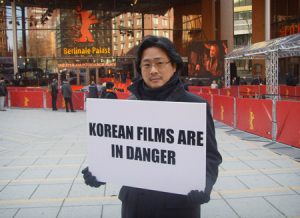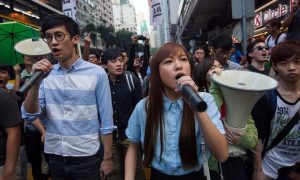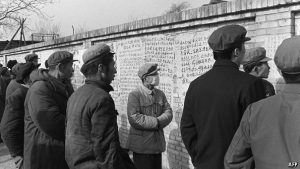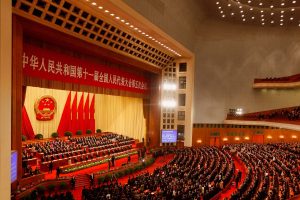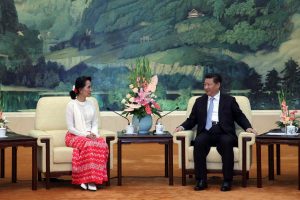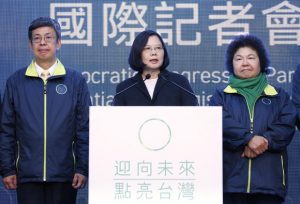Subsidies and the Film Industry: Lessons from France and South Korea
Memo #390 By: Patrick Messerlin – patrick.messerlin [at] gmail.com and Jimmyn Parc – jimmynparc [at] gmail.com With the continued dominance of Hollywood films around the world, policy makers in Asia and elsewhere are increasingly considering government subsidies as a major fuel for strengthening their national film industries. However, the true effectiveness of subsidies on […]
After the LegCo Oath Controversy, What’s Next for Hong Kong?
Memo #389 By: Justin Kwan – justin.kwan [at] alumni.ubc.ca Escalating tensions raise further concern about Hong Kong’s democracy Hong Kong’s democratic system has been dealt a severe blow after two democratically elected lawmakers who advocated independence from China, Sixtus “Baggio” Leung and Yau Wai-ching, were expelled from office. Beijing, in its interpretation of Hong Kong’s Basic […]
Democracy Wall, Foreign Correspondents, and Deng Xiaoping
Memo #384 By: Andrew Chubb – achubb [at] gmail.com The significance of Western media coverage of the Democracy Wall Movement in China for the present. Between November 1978 and April 1979, Chinese citizens took to putting up wall posters on the streets of various cities in China, airing Cultural Revolution grievances, and calling for the […]
Constructed Hierarchical Government Trust in China: Formation Mechanism and Political Effects
Memo #382 By: Zhenhua Su – suzh [at] zju.edu.cn, Yanyu Ye, Jingkai He and Waibin Huang – huangwb [at] zucc.edu.cn In a political system, trust is of great importance for both legitimacy and effectiveness. A government with low levels of political trust will be more likely to face difficulties in finding public support for and […]
A Pariah No More: How Over-reliance on China Spurred Myanmar’s Reforms
Memo #380 By: Jonathan T. Chow – jchow [at] umac.mo and Leif-Eric Easley – easley [at] post.harvard.edu How Over-reliance on China Spurred Myanmar’s Reforms In late 2010, Myanmar’s repressive military junta transformed itself into a nominally civilian government, over two decades after it had seized power. Upon becoming president in early 2011, former general Thein Sein unexpectedly launched wide-ranging […]
Reflection Requires Reading: A New Japanese Middle School History Textbook
Memo #379 By:Hyung Gu Lynn – hlynn [at] mail.ubc.ca Despite the regular protests by South Korean and Chinese governments there remains confusion about Japanese history textbooks in terms of their production, approval, adoption, reception, and contents. Separate teams work to produce texts for private publishers, and these are approved or declined by the Ministry of Education, […]
The Heroism in Edge of Tomorrow
Memo #378 By: Cyrus Huiyong Qiu – cyrusqiu [at] mail.ubc.ca Doug Liman’s epic action sci-fi movie Edge of Tomorrow (starring Tom Cruise and Emily Blunt) in 2014 was the very first adaptation of Japanese “light novel,” in this case one titled All You Need is Kill, by Hiroshi Sakurazaka. The story is about humanity’s fight to […]
Taiwanese Public Support For the Trans-Pacific Partnership: A Deal Breaker?
Memo #377 By: Timothy S. Rich – timothy.rich[at]wku.edu and Lucas Knight – lucas.knight078[at]topper.wku.edu Twelve countries comprising nearly 40 percent of the global economy signed onto the Trans-Pacific Partnership (TPP) in February. Taiwan’s president-elect Tsai Ing-wen of the Democratic Progressive Party (DPP) has indicated her support for joining, yet persuading the Taiwanese public may take additional work. […]
New Veto Player in Town: The 20th South Korean National Assembly Elections
Memo #376 By: Hyung Gu Lynn – hlynn [at] mail.ubc.ca Perhaps the most unexpected result of the South Korean National Assembly Elections of April 13 was the emergence of Ahn Cheol-Soo’s People’s Party (PP) as not just a viable but significant third party (38 out of 300 seats; 26.7% of the popular vote). How did the […]
What Appears After the End of the World? Post-Humanity in Japanese Anime, Manga, and Novel of the 1980s
Memo #375 By: Shota Iwasaki – shota.iwasaki [at] alumni.ubc.ca Depictions of cyborgs, extraterrestrials, and dystopias in fiction are not about the future, but are about contemporary society and their current transformations. Given this, what fears, hopes, and desires did Japanese science fiction at the height of affluence in the 1980s reflect? After radical student movements and rapid economic […]
